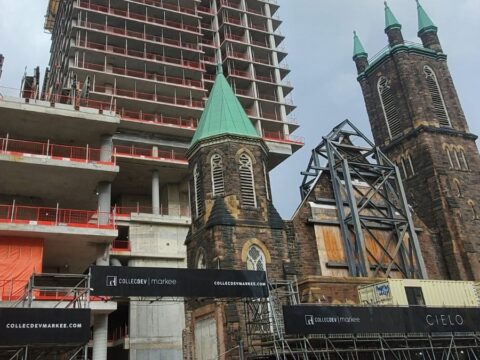Almost a year after cutting $3.3 million from the national church budget and laying off 11 percent of its Toronto-based staff, General Council Executive was still feeling the aftershocks of its decisions at its spring meeting.
Reams of correspondence from congregations and committees across the church voiced ongoing dismay over cutbacks and questioned the process that led to them. One report analyzing the now-completed General Council restructuring pointed to “eroded trust.” Another report on conciliar governance pointed to “a crisis of trust in the United Church leadership.”
You may unsubscribe from any of our newsletters at any time.
But the most critical report came from an independent consultant, who was asked to analyze the church’s readiness for a proposed $200-million fundraising campaign. First floated in spring 2007, the campaign could have helped bridge the ever-widening gap between Mission and Service Fund givings and operating costs, and establish a solid foundation for what was described as the “third generation” of the United Church.
But based on church-wide surveys, interviews and discussions, KMA Consultants found that the church is not ready for such a campaign. Vaguely stated goals are partly to blame, but the bigger problems are “a sense of disconnection between congregations and General Council Office” and “a lack of leadership” throughout the church. The consultants also found a “lack of confidence in the ability of national structures to make decisions about priorities.”
Instead of willing donors, the consultants discovered church members and ministers discouraged by shrinking membership, tight local finances, over-worked staff and low commitment. “People are eager for transformation but don’t know from where the leadership for transformation will come,” says the consultant’s report. “They do not feel they are seeing it from General Council or General Council Offices and are not optimistic it will be forthcoming.”
Don Hunter, chair of the General Council finance committee, was “disappointed but not shocked” at the report’s findings. “I was hoping to hear we were 80 percent ready and with a little effort, we could be there.” Instead, the report shows a church that is “about 20 percent ready” for a big financial campaign. The challenge now, he says, is “to take the KMA findings forward to General Council in a positive way.”
Early in the Executive meeting at a Toronto airport hotel, General Council general secretary Nora Sanders mused that the money might have offered an easy fix, but it is “neither the biggest problem nor the solution. Let’s find ways to get at the bigger questions.” Still, the church’s ability to fundraise reflects the way it makes decisions, organizes itself and puts its decisions into action. So the question of trust may be the biggest one the Executive asks itself, now just a year away from the next General Council meeting.
Despite various issues-based splits between congregations and General Council in the last two decades, the current crisis of confidence is not based on disagreement over hot-button issues. KMA researchers found that same-sex marriage, for example, is a non-issue. Instead, leadership, or lack of it, is the stumbling block. That leadership void is not just from individuals but church courts, offices and structures. The findings led some Executive members to consider the effects of their collective actions.
Jim Blanchard of Kensington, P.E.I., who chairs a national permanent committee said, “We’ve had an outside body come in and say, ‘You’ve got a big problem with your own people not trusting you.’ What’s the implication of lack of trust for all the things we do?”
The most obvious implication is financial, since the $200-million fundraising initiative is off the immediate horizon. The 2009 Mission and Service Fund goal was set at an optimistic $32.5 million last fall (a three percent hike over the 2008 goal of $31.5 million), in the hope that fund supporters would soften the effect of budget cuts with increased donations. Instead, last year’s M&S Fund fell $223,000 short of its $30.2-million goal and only $8,000 in special gifts came in to offset cutbacks.
The consultants’ report will be reviewed by a committee of Executive members, who will “identify the implications of the findings for the future work of the church.” Those findings will come back to the fall Executive meeting, then go to General Council.
The Executive also assigned a committee to prepare a “State of the Church” report for General Council, to “include an overview of the financial situation of the church, and implications this may have for decisions of the General Council.”
The good news, says Rev. Martha ter Kuile of Toronto, is that General Council staff and volunteers are taking the KMA report seriously. An Executive member and chair of a national permanent committee, ter Kuile says, “reality is sometimes tough to look at, but everyone has said, ‘Hey, this is important.’
“I see some very good work going on in terms of taking responsibility.”
***
This story first appeared in The United Church Observer’s July/August 2008 issue with the title “Report cites leadership gap as major fundraising hurdle.”














